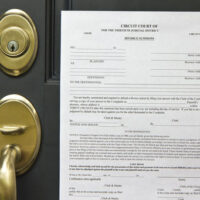I Was Served Divorce Papers – Now What?

It can be intimidating to be served with divorce papers, even if you knew they were coming. Although we most commonly think of divorce papers as the list of allegations and requests your spouse is making of you, this petition is only one part of the papers you have been served. Other documents included in the paperwork may include a citation or summons, a blank financial statement, a document stating which judge is presiding over your case, a statement that you may not sell or transfer some marital assets, and a motion for temporary orders, if applicable.
Next Steps
You may first wish to look through the papers served on your own. The two most likely to catch your attention are the divorce petition will simply lay out your spouse’s allegations and requests, and the citation. The citation or summons tells you how long you have to respond to the divorce petition. If you do not respond within the time frame on the citation, then your spouse may be able to obtain a default judgment granting him or her everything requested, or a judge’s view of what is reasonable.
While it is normal to want to look through and process the paperwork on your own, it is essential to contact an experienced attorney immediately. Texas law allows you until 10:00 AM on the Monday following 20 days after service of the citation and petition for divorce. Work with your attorney to file a response prior to the deadline. This does not indicate that you agree with the divorce, only that you agree to participate in the court proceedings. This gives you a chance to have legal input into whether or not you divorce, division of assets, child custody, and other important decisions made in the divorce process.
An attorney will also be able to help you understand and appropriately respond to other items in your packet of divorce paperwork. Counterclaims and temporary motions may also need to be filed on your behalf, particularly if your spouse is claiming that you are responsible for the dissolution of the marriage.
Settlement & Litigation
Even though you have been served with, and will need to respond via, legal documents, this does not automatically mean that your divorce will go to court. Through your attorneys, you and your spouse can still come to an agreement on all relevant issues, including:
- Child support
- Child custody
- Spousal support (alimony)
- Division of marital assets
Only if you cannot come to an agreement on these and any other issues at hand in your divorce will you need to move on to litigation. At that point, both attorneys will begin seeking financial records and other evidence to use in trial. This can be a long process, at the end of which the court will decide what the conditions of your divorce will be.
Contact an Attorney
Due to the time limitations on responding to a divorce petition, do not wait to contact an experienced family law attorney. The Houston family attorneys at Lindamood & Robinson, P.C. will not only help you to understand the divorce proceedings, but will work to help you to obtain the best possible divorce settlement. Contact us today to schedule a consultation.
Resource:
statutes.capitol.texas.gov/Docs/FA/htm/FA.6.htm#6.501


